Jennifer Jean Warnes is an American singer and songwriter. She has performed as a vocalist on a number of film soundtracks. She has won two Grammy Awards, in 1983 for the Joe Cocker duet "Up Where We Belong" and in 1987 for the Bill Medley duet "(I've Had) The Time of My Life". Warnes also collaborated closely with Leonard Cohen.

Phyllis Linda Hyman was an American singer, songwriter, and actress. Hyman is best known for her music during the late 1970s through the early 1990s, some of her most notable songs were "You Know How to Love Me" (1979), "Living All Alone" (1986) and "Don't Wanna Change the World" (1991).

Phillip George Vassar Jr. is an American country music artist. Vassar made his debut on the country music scene in the late 1990s, co-writing singles for several country artists, including Tim McGraw, Jo Dee Messina, Collin Raye, and Alan Jackson. In 1999, he was named by American Society of Composers, Authors, and Publishers (ASCAP) as Country Songwriter of the Year.

Antonio Marquis "L.A." Reid is an American record executive, A&R representative, and record producer. He is the founder and served as co-chairman of Hitco Entertainment. He also previously served as the chairman and CEO of Epic Records and The Island Def Jam Music Group, as well as the president and CEO of Arista Records.
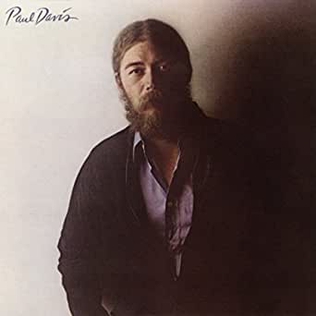
Paul Lavon Davis was an American singer and songwriter, best known for his radio hits and solo career that started worldwide in 1970. His career encompassed soul, country, and pop. His most successful songs are 1977's "I Go Crazy", a No. 7 pop hit that once held the record for the longest chart run on the Billboard Hot 100, and 1982's "'65 Love Affair", which at No. 6 is his highest-charting single. Another pop hit, "Cool Night", was released in 1981. In the mid-1980s, he also had two No. 1 country hits as a guest vocalist on songs by Marie Osmond and Tanya Tucker.

"Weekend in New England" is a song recorded by Barry Manilow for his fourth studio album, This One's for You (1976). Written by Randy Edelman, it was released as the second single from the album, and became a Top Ten hit on the Billboard Hot 100, while topping the Adult Contemporary chart.

Come Dancing with The Kinks: The Best of 1977-1986 is a double album compilation by the Kinks, released on Arista Records in 1986. It contains thirteen tracks released as singles, only one of which did not also appear on album, and six album tracks. Every one of the band's seven albums released by Arista during the time period indicated is represented here. Designed specifically for the American market, it peaked at No. 159 on the Billboard 200 and failed to chart in the United Kingdom. A version for compact disc was issued in 2000 by Koch Records. Liner notes are by John Swenson, and the original recordings were produced by Ray Davies.
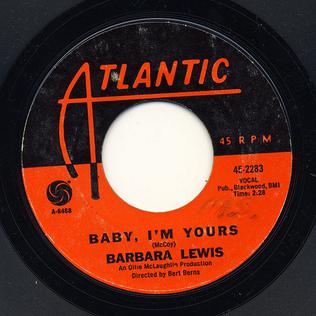
"Baby I'm Yours" is a song written by Van McCoy which was a hit in 1965 for Barbara Lewis, the original recording artist. The song was featured in the 1995 film The Bridges of Madison County and was included on the soundtrack album. It was also featured in the TV movies The Midnight Hour (1985) and An American Crime (2007), as well as being briefly featured in Baby Driver.

Low Budget is the eighteenth studio album by English rock group the Kinks, released in 1979. Following the minor success of their 1978 album Misfits, the band recorded the majority of the album in New York rather than London. Unlike the more nostalgic themes of many Kinks albums prior to Low Budget, many of the album's songs allude to contemporaneous events. Musically, the album is a continuation of the band's "arena rock" phase, resulting in a more rock-based sound and more modern production techniques.
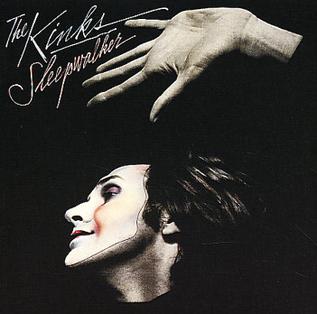
Sleepwalker is the sixteenth studio album by the English rock group, the Kinks, released in 1977. It marked a return to straight-ahead, self-contained rock songs after several years of concept albums. It is the first album in what critics usually call the "arena rock" phase of the group, in which more commercial and mainstream production techniques would be employed. The album also marks the last appearance of bassist John Dalton, who left the band during the recording sessions. Dalton plays bass on all songs on the album save for "Mr. Big Man". The lineup of the Kinks would be trimmed down significantly in 1977 following the album's release, as the brass section and backup singers were removed and the band returned to a standard rock band outfit.

"The Game of Love" is a song by American rock band Santana from their 19th studio album, Shaman (2002). The vocal performance on the song is by Michelle Branch. It was composed by Gregg Alexander and Rick Nowels. The song was released as a single on September 23, 2002, and won a Grammy Award for "Best Pop Collaboration with Vocals", as well as peaking at number five on the Billboard Hot 100 singles chart. The song also reached the top 10 in Canada, New Zealand, and six European countries.
Peter James McCann was an American songwriter, musician, lecturer, and songwriters' activist. He was known for writing successful pop-rock and country songs, including his 1977 solo hit "Do You Wanna Make Love", and "Right Time of the Night" for Jennifer Warnes.

Melissa Manchester is the self-titled and the eighth album release by singer-songwriter Melissa Manchester issued on Arista Records the first week of October 1979.

"Don't Cry Out Loud" is a song written in 1976 by Peter Allen with lyricist Carole Bayer Sager that is best known as a hit single for Melissa Manchester in the US and for Elkie Brooks in the UK.
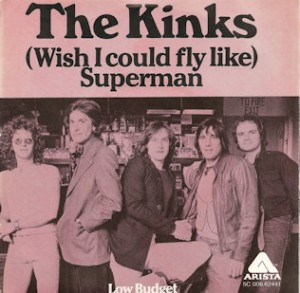
"(Wish I Could Fly Like) Superman" is a song written by Ray Davies that was first released on the Kinks' 1979 album, Low Budget. The song, inspired by Superman: The Movie, employs a disco beat and lyrics that describe the singer's wish to be like the fictional character Superman. The song's disco style was created as a response to Arista Records founder Clive Davis's request for "a club-friendly record," despite Ray Davies' hatred of disco.

Jennifer Warnes is the fourth album by American singer/songwriter Jennifer Warnes, released in late 1976 as her inaugural Arista Records album. It was her first album to be credited as Jennifer Warnes, after being credited as simply "Jennifer" on her first three albums. The disc generated Warnes' first Billboard Hot 100 single "Right Time of the Night" which also ranked on the Billboard hit listings of C&W and Easy Listening tracks, with "Right Time..." reaching No. 1 on the latter. The second single, "I'm Dreaming" also reached the Easy Listening top ten.

Best of Jennifer Warnes is a 1982 compilation album by singer/songwriter Jennifer Warnes comprising five of her six Billboard Hot 100 singles - including the Top 40 hits "Right Time of the Night" and "I Know a Heartache When I See One" - supplemented by four other tracks also recorded for Arista Records. In addition the album gave Warnes' recording of "It Goes Like It Goes" its first wide release.
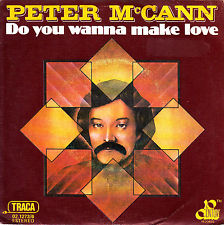
"Do You Wanna Make Love" is a song written and performed by Peter McCann, an American songwriter. The song was featured on his 1977 album, Peter McCann. "Do You Wanna Make Love" was produced by Hal Yoergler.

Funny Lady is the soundtrack album of the 1975 musical film of the same title, starring Barbra Streisand. Released by Arista Records on March 15, 1975, arranged, conducted, and coordinated by Peter Matz, the album's fifteen tracks are performed by Streisand, James Caan, and Ben Vereen. A sequel to the 1968 musical comedy-drama Funny Girl, the songs extend the semi-biographical account of the life of American performer Fanny Brice. Funny Lady also included songs written by Brice's third husband Billy Rose. New music by Kander and Ebb included "How Lucky Can You Get", the album's only single, released in April 1975.

















